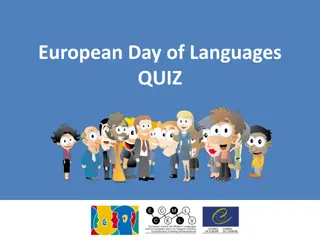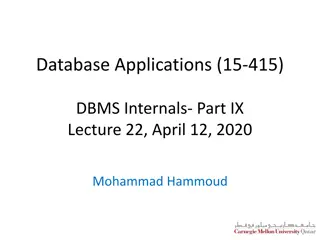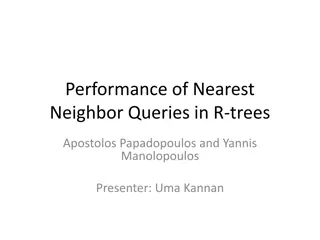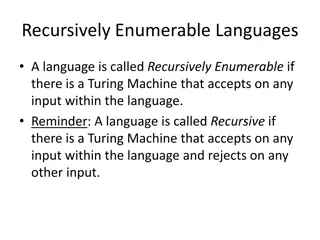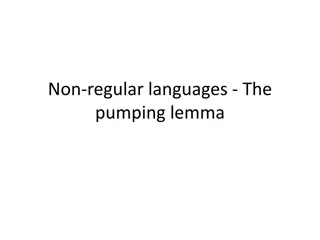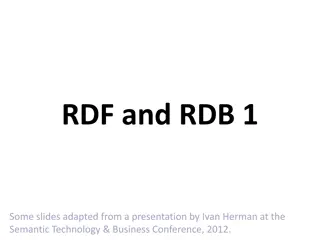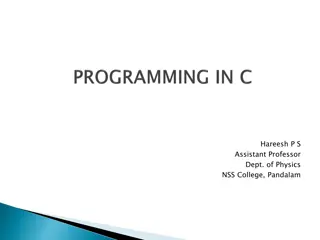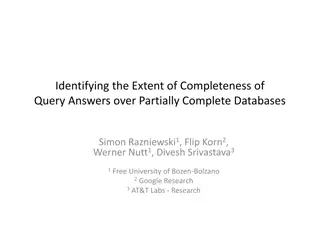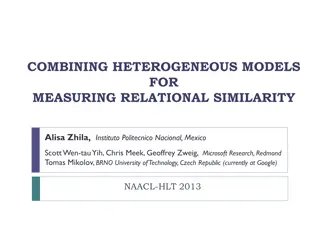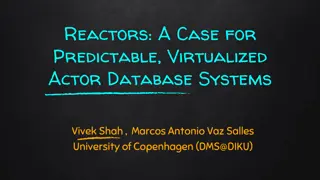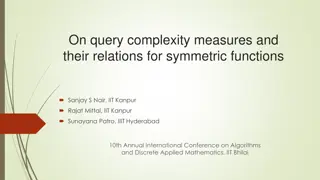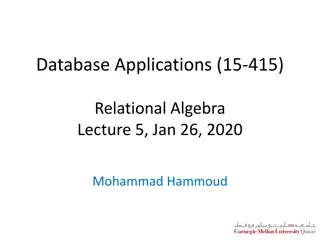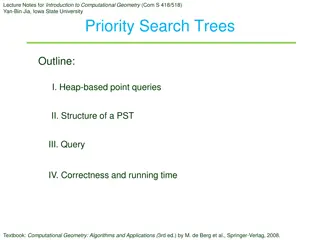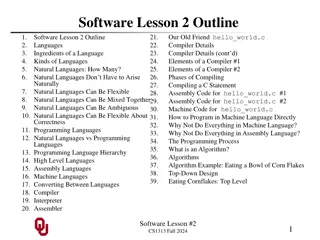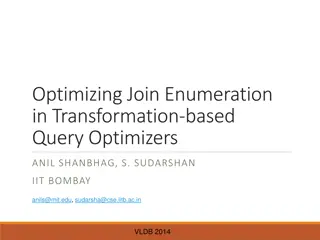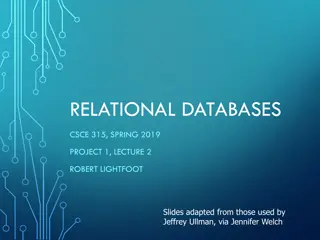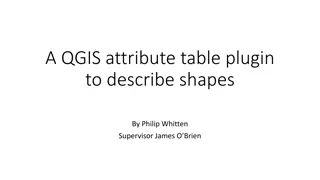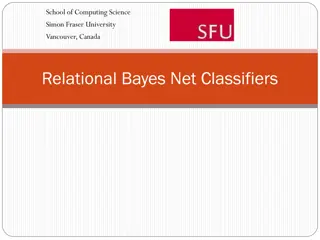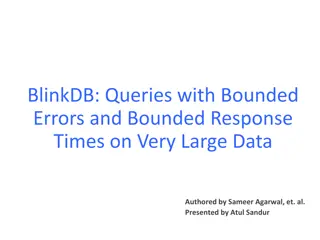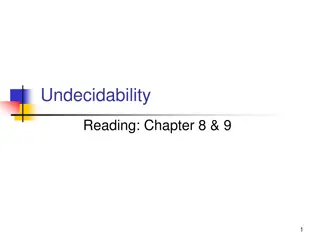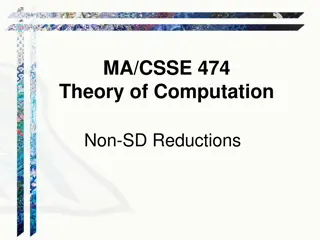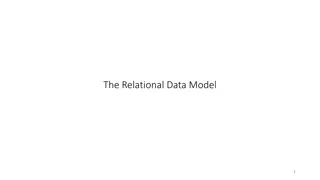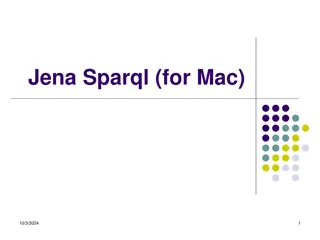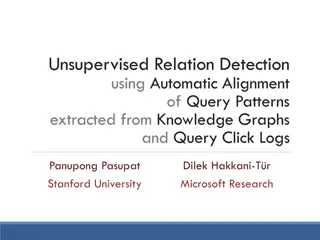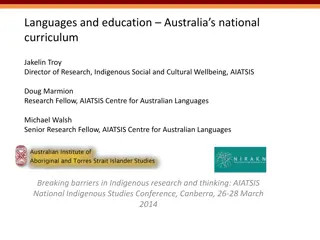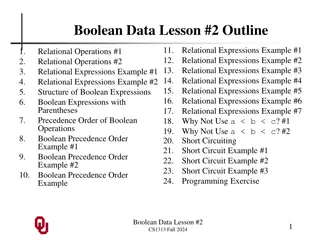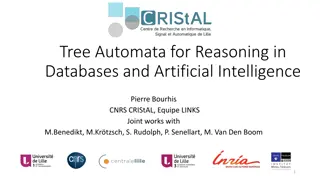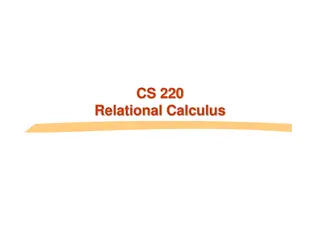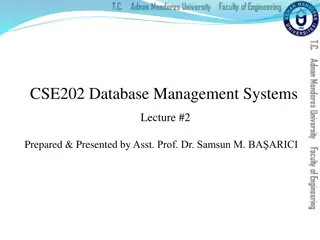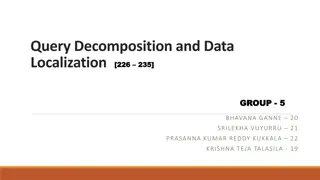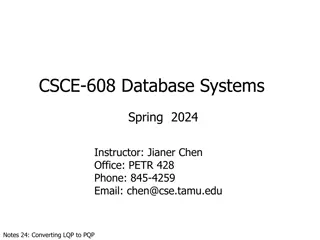Progressive Approach to Relational Entity Resolution
In this research paper authored by Yasser Altowim, Dmitri Kalashnikov, and Sharad Mehrotra, a progressive approach to relational entity resolution is presented. The study focuses on balancing cost and quality in entity resolution tasks for relational datasets. The goal is to develop a method that ac
1 views • 20 slides
European Day of Languages QUIZ
Explore interesting facts about languages in the world through a quiz. Discover the number of living languages, the origins of written language, official languages like Azeri, and the history of sign languages. Test your knowledge on the European Day of Languages!
6 views • 24 slides
Query Optimization in Database Management Systems
This content covers the fundamentals of query optimization in Database Management Systems (DBMS), including steps involved, required information for evaluating queries, cost-based query sub-system, and the role of various components like query parser, optimizer, plan generator, and cost estimator. I
2 views • 51 slides
Performance of Nearest Neighbor Queries in R-trees
Spatial data management research focuses on designing robust spatial data structures, inventing new models, constructing query languages, and optimizing query processing. This study explores the estimation of query performance and selectivity, specifically in R-trees, for efficient access planning.
3 views • 32 slides
Recursive vs Recursively Enumerable Languages
Comparison between recursive and recursively enumerable languages in terms of Turing Machines acceptance, decidable languages, recognizable languages, and partial predicates. Explains the concepts with examples and how Turing Machines decide membership in languages.
0 views • 8 slides
Non-Regular Languages and the Pumping Lemma
Dive into the world of regular and non-regular languages, exploring the concept of the pumping lemma. Learn about different types of non-regular languages and why some languages require an infinite number of states to be represented by a finite automaton. Find out why mathematical proofs are essenti
0 views • 62 slides
Exporting Relational Data to RDF: Strategies and Considerations
Explore the process of mapping relational data to RDF, including the choice of RDF vocabulary, defining mapping techniques, and exporting strategies. Learn about RDB systems that support RDF, direct mapping approaches, and the use of hybrid storage solutions. Discover how to bridge SPARQL and SQL fo
4 views • 13 slides
Overview of Grammar Types and Chomsky Hierarchy
The four types of grammars are General, Context-Sensitive, Context-Free, and Linear grammars, each recognizing a specific set of languages. Chomsky Hierarchy categorizes these grammars into four levels, indicating subsets of languages they can recognize. Context-free grammars have specific productio
0 views • 17 slides
Programming Languages: Levels and Basics
Programming languages facilitate communication between humans and computers, with machine language being the fundamental binary code understood by computers. Different levels of programming languages exist, from low-level machine language to high-level languages like C. Natural languages are meant f
2 views • 35 slides
The Currency of Love: Importance of Communication and the 5 Languages of Love
Understanding the essence of love lies in effective communication and expressing love through the five languages - Words, Gifts, Actions, Time, and Physical Touching. Communication is depicted as the currency of love, essential for deepening bonds between partners. Gary Chapman's concept of the 5 La
4 views • 33 slides
Identifying Completeness of Query Answers in Incomplete Databases
The study delves into how to assess the completeness of query answers when dealing with partially complete databases. By analyzing data from a telecommunication company’s data warehouse, the query results are examined to determine if all warnings generated by maintenance objects with hardware team
0 views • 23 slides
Enhancing Relational Similarity Measurements: A Model Combination Approach
This study explores combining heterogeneous models for measuring relational similarity, showcasing the importance of general relational similarity models. It discusses the degrees of relational similarity and introduces a directional similarity model that outperforms previous systems. The approach l
0 views • 23 slides
Reactor: A Case for Predictable, Virtualized Actor Database Systems
Exploring the integration of actor programming models in modern relational databases to achieve high performance. The focus is on addressing challenges related to stored procedures, data partitioning, modularity, isolation, software engineering, and performance. The talk outlines motivation, the rel
0 views • 41 slides
Quantum Query Complexity Measures for Symmetric Functions
Explore the relationships between query complexity measures, including quantum query complexity, adversary bounds, and spectral sensitivity, in the context of symmetric functions. Analysis includes sensitivity graphs, the quantum query model, and approximate counting methods. Results cover spectral
0 views • 19 slides
Relational Query Languages in Database Applications
In this lecture, Mohammad Hammoud discusses the importance of relational query languages (QLs) in manipulating and retrieving data in databases. He covers the strong formal foundation of QLs, their distinction from programming languages, and their effectiveness for accessing large datasets. The sess
0 views • 39 slides
Introduction to Priority Search Trees in Computational Geometry
This lecture outlines the structure and query process of Priority Search Trees (PST) in computational geometry. It covers heap-based point queries, range trees for windowing queries, handling query ranges in 1D and 2D spaces, and using heaps to efficiently handle query ranges. The content discusses
1 views • 18 slides
Challenges and Innovations in Relational Engine Algorithms
Exploring the complexity of processing graph data in relational query engines, this content delves into the challenges faced, practices adopted in academia, and innovative solutions like LMS-NPRR, trie join, and specialized data structures. It discusses the difficulties in handling acyclic vs. cycli
0 views • 27 slides
Languages in Software Development
Exploring the fundamentals of languages in software development, this content covers natural languages, programming languages, and the components of a language like symbols, grammar, and semantics. It delves into the differences between natural and programming languages, highlighting the essential r
0 views • 39 slides
Optimizing Join Enumeration in Transformation-based Query Optimizers
Query optimization plays a crucial role in improving database performance. This paper discusses techniques for optimizing join enumeration in transformation-based query optimizers, focusing on avoiding cross-products in join orders. It explores efficient algorithms for generating cross-product-free
0 views • 18 slides
Fundamentals of Relational Databases in CSCE 315 - Lecture Highlights
Introduction to relational databases covering topics such as relational data model, schemas, converting from entity-relationship model, entity sets, relations, relationships, combining relations, and practical examples. Learn about storing data in tables, attributes, database organization, and the i
1 views • 18 slides
Practical Tools for Corpus Search Using Regular Expressions and Query Languages
These notes explore practical tools for corpus search including regular expressions and the corpus query language (CQL/CQP). They provide an introduction to using corpora effectively for pattern identification, with examples and explanations. The guide includes information on levels of annotation an
0 views • 47 slides
Enhancing Spatial Data Analysis in QGIS
Explore the integration of relational databases with QGIS to facilitate efficient spatial data analysis. Discover the importance of recognizing spatial relationships within data sets and the solutions to enhance QGIS for relational datasets. Overcome challenges and delve into the intersection and su
0 views • 25 slides
Relational Bayesian Networks in Statistical Inference
Relational Bayesian networks play a crucial role in predicting ground facts and frequencies in complex relational data. Through first-order and ground probabilities, these networks provide insights into individual cases and categories. Learning Bayesian networks for such data involves exploring diff
0 views • 46 slides
Overview of BlinkDB: Query Optimization for Very Large Data
BlinkDB is a framework built on Apache Hive, designed to support interactive SQL-like aggregate queries over massive datasets. It creates and maintains samples from data for fast, approximate query answers, supporting various aggregate functions with error bounds. The architecture includes modules f
0 views • 26 slides
Recursive and Recursively Enumerable Languages
Exploring the concepts of decidability and undecidability in computer science, specifically focusing on Recursive and Recursively Enumerable (RE) languages. Recursive languages always halt, while RE languages may or may not halt, showcasing the differences between decidable and undecidable problems.
0 views • 35 slides
Non-SD Languages in Theory of Computation
Explore the concept of Non-SD languages in the theory of computation, which are larger in number compared to SD languages. Non-SD languages involve infinite search or analyzing whether a Turing Machine will loop indefinitely. Discover examples and insights into proving languages are not SD through c
0 views • 38 slides
The Relational Data Model and Database Concepts
Delve into the world of relational data modeling, database integrity rules, and structure. Explore how a university database in MS Access utilizes relational tables and fields to store information. Learn about the key terminology associated with relational databases, such as primary keys, foreign ke
0 views • 69 slides
Computer Programming Principles
Dive into the world of computer programming, covering high-level and machine languages, compilers, interpreters, writing programs, top-down design, and the array of programming languages available. Understand the essentials of building code to control computers, the diversity of programming language
0 views • 23 slides
Jena SPARQL for Mac and RDF Queries
Jena SPARQL for Mac is a powerful tool for querying RDF graphs using SPARQL. Learn about RDF graphs, models, triples, and how SPARQL queries work. Explore ARQ, a query engine that supports the SPARQL RDF Query language and features multiple query languages. Discover how to install ARQ and execute SP
0 views • 25 slides
Unsupervised Relation Detection Using Knowledge Graphs and Query Click Logs
This study presents an approach for unsupervised relation detection by aligning query patterns extracted from knowledge graphs and query click logs. The process involves automatic alignment of query patterns to determine relations in a knowledge graph, aiding in tasks like spoken language understand
0 views • 29 slides
Preserving Australian Indigenous Languages in Education
The development of the Framework for Aboriginal Languages and Torres Strait Islander Languages in the Australian Curriculum aims to give equal representation to Australian languages alongside other world languages in schools. This initiative helps preserve, document, and maintain indigenous language
0 views • 28 slides
Relational Operations for Boolean Expressions
Learn about relational operations in Boolean expressions through examples and explanations. Discover how to compare numeric operands to produce Boolean results, covering equal to, not equal to, less than, less than or equal to, greater than, and greater than or equal to operations. The content inclu
0 views • 25 slides
Automata for Query Optimization in Databases and AI
Explore the use of tree automata for reasoning, querying databases using logic languages, optimizing queries through relation algebra, and core problems in query optimization. Learn about data exchange on the web, inference of information from incomplete data, and the semantics of Datalog programs f
0 views • 44 slides
Introduction to Relational Calculus and Algebra in Database Management
Explore the fundamental concepts of relational calculus and algebra in the domain of database management. Understand the differences between declarative and imperative query languages and learn to retrieve information using practical examples and theoretical frameworks such as tuple relational calcu
0 views • 23 slides
CSE202 Database Management Systems
The basics of relational algebra and calculus in database management, covering unary and binary relational operations, query examples, tuple and domain relational calculus. Explore the set of operations and declarative language used for specifying relational queries.
0 views • 45 slides
Query Processing in Relational Algebra: Transforming, Estimating Costs, and Generating Plans
This content delves into the intricacies of query processing at the relational algebra level. It covers transformations, estimation of costs, detailed query plan generation, and plan comparison. The process involves estimating the cost and size of query plans, calculating the number of IO operations
0 views • 20 slides
Query Decomposition and Data Localization
This content discusses the process of query decomposition and data localization in databases. It covers topics such as analysis of query graphs, elimination of redundancy in queries, and rewriting queries for better efficiency. The examples provided illustrate the importance of semantic correctness
0 views • 25 slides
Converting Logical Query Plans to Physical Query Plans in DBMS
Illustrations and steps involved in the process of converting logical query plans (LQP) to physical query plans (PQP) in database management systems (DBMS), focusing on optimization, algorithm implementation, and handling security issues. The images provide a visual guide to constructing physical qu
0 views • 36 slides
Report Writers Meeting with Query Performance Tips
A meeting was held on 12/08/2015 with Gary Yates to discuss query performance tips for report writers. The session covered important aspects such as retrieving necessary fields, using single list views or crosstabs effectively, and keeping query calculations simple. Additionally, insights on partiti
0 views • 14 slides
Efficient Query Execution on Raw Data Files
This research explores NoDB, a database system designed to eliminate the bottleneck of data-to-query time by querying raw data files in their original location. By redesigning the query processing layer to query raw data in situ state while automatically creating auxiliary structures, NoDB aims to m
0 views • 34 slides

